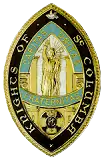Knights of St Columba
The Knights of St Columba is a fraternal service order affiliated with the Catholic Church in Scotland and in England and Wales.[1] Founded in Glasgow in 1919,[2] the Knights are named in honour of Saint Columba, a 6th-century missionary descended from the Gaelic nobility of Ireland in modern County Donegal, who successfully evangelized both the Picts and Gaels of modern Scotland. The Knights describes themselves as dedicated to the principles of Charity, Unity and Fraternity.[3] There are around 4,000 members of the KSC, in over 240 councils across Great Britain — it features in England, Scotland and Wales. Membership is limited to Catholic men aged 16 and over, and promotes the social doctrine of the Catholic Church.[1]
.png.webp) | |
| Abbreviation | KSC |
|---|---|
| Formation | 5 October 1919 |
| Type | Catholic fraternal service Order |
| Headquarters | 196 Clyde St, Glasgow G1 4JY |
Supreme Knight | Harry Welsh |
Key people | The Incorporators |
| Website | www.ksc.org.uk |
The organisation is non-political and essentially democratic, does not admit women, and exists to support the mission of the Catholic Church. The KSC organisation is a member of the International Alliance of Catholic Knights. Founder of the Knights and first Supreme Knight was P. J. O'Callaghan.
Admission ceremonies usually take place in a Catholic parish during the celebration of Mass.
The group organises annual pilgrimages to Aylesford Priory in Kent and Carfin Lourdes Grotto near Motherwell in North Lanarkshire.
Organisation

At local level, Members belong to a Council or Charter Council, led by the Grand Knight. The Charter Councils in an area (often corresponding to a Catholic Diocese) come together to form a Province, under the Provincial Grand Knight. Provinces are arranged into larger areas known as Regions, under the Regional Director, who is a member of the Board of Directors. Representatives of the Board of Directors, Regions and Provinces meet at least once annually at the Supreme Council which governs the Order. The Supreme Knight presides over the Supreme Council.
Chronology of Supreme Knights
- 1919–1922 Patrick Joseph O'Callaghan
- 1922–1929 Edward Henry
- 1929–1933 William Bishop KSG
- 1933–1936 Thomas Davis
- 1936–1945 William Loughrey
- 1945–1948 Thomas Leyland
- 1948–1951 Laurie Arnold
- 1951–1952 Daniel Kelly
- 1952–1955 Thomas McMenemy
- 1955–1958 James Mitton MBE
- 1958–1961 Francis Mildner
- 1961–1964 Stuart Harper
- 1964–1967 William Austin
- 1967–1970 P. N. Scott
- 1970–1972 Michael May
- 1972–1975 Martin Cairns
- 1975–1978 Christopher Seneviratne
- 1978–1981 Anthony Rouse KCSG KHS
- 1981–1984 P. Layden KCSG KHS
- 1984–1987 Walter Downey
- 1987–1990 Francis Redmond KCSG
- 1990–1993 Anthony Bateman KSG
- 1993–1996 Anthony Britten KCSG KCHS
- 1996–1999 Kenneth Hargreaves KSG
- 1999–2002 Anthony Britten KCSG KCHS
- 2002–2005 Anthony Doherty KSG
- 2005–2008 John Doran KSG
- 2008–2011 Jonjo McDonagh KSG
- 2011–2014 Ron Lynch KSG
- 2014–2017 Charlie McCluskey KSG
- 2017–2021 Bertie M. Grogan KSG
- 2021–present Henry Welsh
Ecclesiastical advisers
- Malcolm McMahon OP, Archbishop of Liverpool
- Tom Neylon, Auxiliary Bishop of Liverpool (12th ecclesiastical adviser) [4]
See also
Sources
Notes
- "Membership of the Knights of Saint Columba". KSC.org.uk. Archived from the original on October 24, 2008. Retrieved 2008-10-31.
- Herbermann, Charles George (1940). The Catholic Encyclopedia. Appleton.
- "Knights of St Columba: A Fraternal Order of Catholic Men". Diocese of Middlesbrough. Retrieved 2008-10-31.
- Knights of St. Columba, New Ecclesiastical Advisor, accessed 20 August 2022
References
- Rogers, Nicholas (2003). Catholics in Cambridge. Gracewing. ISBN 0-85244-568-7.
- Barberis, Peter (2003). Encyclopedia of British and Irish Political Organizations. Continuum International Publishing Group. ISBN 0-8264-5814-9.